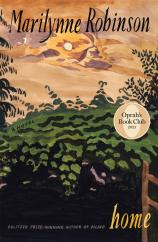Reading Group Guide
Discussion Questions
Home

1. What does “home” mean to Robert Boughton and his children? What does the Boughton house signify to his family? With whom do they feel most at home?
2. How does Glory’s opinion of Jack change throughout the novel? What enables them to trust each other? In what ways is that trust strained? How does their relationship compare to yours with your siblings?
3. How is the Boughton household affected by the presence of a television set? How does this reflect a shift that took place in many households throughout America in the 1950s? Were you surprised by Robert Boughton’s comments about African Americans, and by his reaction to the televised race riots?
4. Why do you think Robert loves Jack best, despite Jack’s shortcomings? What is your understanding of Jack’s wayward behavior? How would you have responded to his theological questions regarding redemption?
5. Discuss the friendship between John Ames and Robert Boughton. What has sustained it for so many years? How did they nurture each other’s intellectual lives, approaching life from Congregationalist and Presbyterian perspectives?
6. What did Glory’s mother teach her about the role of women? How was the Boughton family affected by the death of its matriarch?
7. How do the Boughtons view prosperity and charity? What is reflected in the way Glory handles the household finances, with leftover money stored in the piano bench? What is the nature of Jack’s interest in Marxism? What is demonstrated in the incident of the book on England’s working classes (the stolen library volume that Robert Boughton considered dull)?
8. How do the themes of deception and integrity play out in the novel? Are all of the characters honest with themselves? Which secrets, in the novel and in life, are justified?
9. What does Jack do with the memory of his out-of-wedlock daughter? Does his father have an accurate understanding of that chapter in Jack’s life?
10. How are Glory, Jack and Robert affected by Teddy’s visit? What accounts for the “anxiety, and relief, and resentment” Glory feels regarding Teddy’s arrival (p. 253)?
11. Discuss Ames’ provocative sermon, which Jack paraphrases as a discussion of “the disgraceful abandonment of children by their fathers” (p. 206) based on the narrative of Hagar and Ishmael. To what degree are parents responsible for the actions of their children, and vice versa?
12. What aspects of romantic love are reflected in HOME? How does Glory cope with her ill-fated engagement? Is Jack very different from Glory’s fiancé? What do the Boughtons think of John Ames’s marriage to Lila?
13. How did you react to Della’s arrival? What legacy and memories will define her son? What common ground did Jack and Della share, fostering love?
14. Hymns provide a meaningful background throughout the novel. What do their words and melodies convey?
15. In terms of religion, what beliefs do Glory, Jack and Robert agree upon? What do they seek to know about God and the nature of humanity? What answers do they find?
16. What distinctions did you detect between the way John Ames described Jack in GILEAD and the portrayal of Jack in HOME? What are the similarities and differences between the Ames and Boughton households? What accounts for the fact that families can inhabit nearly identical milieux but experience life in profoundly different ways?
17. Do towns like Gilead still exist? Are pastors like Ames and Boughton common in contemporary America?
18. Discuss the homecomings that have made a significant impact on your life. How much forgiveness has been necessary across the generations in your family?
Home
- Publication Date: September 1, 2009
- Paperback: 336 pages
- Publisher: Picador
- ISBN-10: 0312428545
- ISBN-13: 9780312428549








